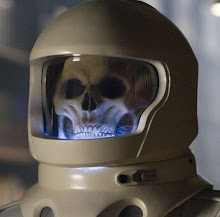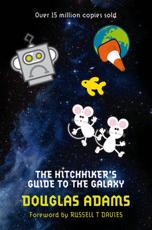 It's Halloween, which means of course it's time for a vaguely Halloween-themed blog post! And, since it's been a long while since I posted a proper book review on this blog (not counting my review of the Hitchhiker's Guide to the Galaxy, which was published on the Cult Den), it's also time for a book review post. So how to combine the two? Well, quite recently I conveniently read a book starring a zombie as its main character, and nothing says Halloween like the shambling undead. So today I'll be reviewing Warm Bodies by Isaac Marion.
It's Halloween, which means of course it's time for a vaguely Halloween-themed blog post! And, since it's been a long while since I posted a proper book review on this blog (not counting my review of the Hitchhiker's Guide to the Galaxy, which was published on the Cult Den), it's also time for a book review post. So how to combine the two? Well, quite recently I conveniently read a book starring a zombie as its main character, and nothing says Halloween like the shambling undead. So today I'll be reviewing Warm Bodies by Isaac Marion.Warm Bodies did not sound like the kind of book I would want to read. A basic summary of the plot - 'R', a nameless zombie with no memories of his past life, falls in love with a human survivor he meets in the city named Julie. That does not sound like a good book to me. It sounds like one of the countless hastily put-together Twilight copies that have sprung up in the last three years, working on the basic outline of 'a love story where one of the romantic leads is a supernatural creature'. To make things worse, there's a quote from Stephanie Meyer on the front cover which proclaims 'I never thought I could care so passionately for a zombie... the most unexpected romantic lead I've ever encountered.' If I had seen this book on the shelf at a bookstore, there's no way I would have picked it up. Which is worrying, because Warm Bodies is actually a great novel.
The best thing about this book, quite simply, is R. He is beyond brilliant as a character and as a protagonist, perfectly crafted and tailor-made for the story. The book is told from his perspective, and his inner dialogue is what elevates the story to its high status. This tale wouldn't work from a third person POV; only through the eyes of R do we see the true complexity of Marion's writing. As a zombie, R is unable to speak in anything other than short, monosyllable sentences. In his mind, however, he is brooding, introspective and contemplative. The book moves at a slow pace because everything R does or sees, he analyses, reads into, mulls over in his head. So much of the story is told through R's philosophical monologue, and for most novels or stories this wouldn't work. On this occasion, however, it fits perfectly - at the novel's start, he is stuck in the dull and repetitive routine of zombiehood, and as such has plenty of time for mental discourse. It was a stroke of genius on the writer's part to make speech so difficult for R, as the gap between what R thinks inwardly, and what he is able to express outwardly, is a central theme in the novel, and a massively endearing character flaw. R is unable to speak his mind, has his freedom of speech stripped from him - not because of tyranny or dictatorship, but because he physically cannot form the words he needs to articulate his thoughts into sentences. This makes him easy to sympathise with; you will care about him more than you ever thought you could for a zombie. Stephanie Meyer got that right, at least.
Marion takes some liberties with the established mythos of zombies so that they work for his story, and for the most part does an admirable job of it. The zombies in Warm Bodies, outwardly, are still the shuffling, groaning corpses, who infect you with a bite and die only if you aim for the head. Inwardly, however, the author has redesigned them completely; these are not the instinctive, non-sentient, predatory zombies of World War Z, the most popular versions of the creature. The zombies in Warm Bodies are more akin to vampires. They are still cognitive, intelligent even in some cases, and capable of rational thought and logic; but the limitations of their decaying bodies prevent them from conveying this, and their insatiable hunger for human flesh drives them inexorably onwards, quite like a vampire's thirst for blood. Because he stamps his own signature on them, but does not make the mistake of altering them beyond recognition, Marion is able to develop an original story within the confines of a tired genre.
Warm Bodies is at its strongest when it is developing its characters, and R is not the only example of this. All of the story's major players are well rounded and interesting. M - a bald, bearded zombie and R's best friend - is as close to comic relief as the book gets, and is unusual amongst the zombie horde in that he possesses a sense of humour. He isn't as layered or developed as some of the other characters, but that suits and begets his role in the story as a comedy sidekick of sorts (albeit a morbidly macabre one). He still manages to lighten the mood in each of his scenes, both for R and for the audience, and provides a much needed change of tone at several points in the otherwise mostly bleak novel. Grigio, the leader of the human survivors, is an excellent foil, pushing the story forward and creating tension and suspense in a story which otherwise moves at a very leisurely pace. He is something of an archetype more than an original creation, but like with M, that fits his role in the story. Perry is a particularly interesting character who plays a very unusual role in the story, which I won't spoil; I will say, however, that he is one of the best examples of retroactive character development I've ever read.
What is one of the only problems I have with the book, unfortunately, is with one of the most important characters, Julie. As an individual, she is superb, with a hundred different layers of nuance to her personality and a well-defined world view that makes it easy to see her point of view in most situations. What I take issue with, sadly, is her relationship with R, the relationship that the whole story is built on and around. Now don't go grabbing the torches and pitchforks just yet; the relationship between the two characters is not badly done or poorly written, far from it. From around the time R attempts to take Julie home, through the city, the development between the two is word-for-word perfect, and something Marion should be applauded for. But Julie's initial reaction to R, for me at least, was a little unbelievable. Surely, having been left alone by R following the slaughtering of all of her friends and fellows, a character as strong-willed and determined to survive as Julie would have attempted some kind of escape? There's also the factor of her relationship with Perry, and how quickly she moves on from him (though admittedly, this is retconned later in the story through her discussions with R about Perry), which stretched my suspension of belief a little too thin. The relationship still works and is still wonderfully written, it's just that there are a few bumps along the way.
Bits and Bobs
- If you have good observational skills, you've probably noticed by now how the character names - R and Julie - match up with those of Romeo and Juliet, reflecting the similarities between the two stories of forbidden love. I must admit, despite the fact that I had been told beforehand the story was very similar to Romeo and Juliet, I only noticed this similarity of names a while after reading the book. If you read a little further into things, M could also be compared to Mercutio, as he acts as the funny to R's serious, and is the main source of comedy in the story.
- If you're unsure as to whether you would enjoy the book, I really recommend checking out some of Isaac Marion's short stories. They're all available for free on his website, and they really show off his writing - they demonstrate both how clever his ideas are, and how amazingly he can put them down on paper. In particular, check out Somnia, Pixel, What it Was Like For Jerry Being Immortal, That's Not Me and the Angriest Stoplight.
To sum up, I really enjoyed this book. I was wrong to assume it was similar to Twilight - in fact, having read it, if somebody compared Warm Bodies to Twilight now, I'd be a little bit insulted on the author's behalf. Which is slightly hypocritical of me, but then hypocrisy is excellent for proving points. It has good writing and phenomenal characters, especially the hero R. Definitely give it a read if you like your stories to be thoughtful and introspective.
And that was my Halloween extravaganza. I know, exciting wasn't it? While you're here, I might as well tell you that my Doctor Who fanseries, Doctor Who: Re-Incarnated, is still going strong, and we release our third story tomorrow at 7pm. It's absolutely fantastic (and I'm not saying that because I wrote it), and I would love for you to check it out. Click on that link there to go to the site, or click on the little 'Doctor Who Re-Incarnated' tab at the top of this blog.
The next blog post will most likely be a Friday Night Who UK update - yes, I said I wasn't going to be doing those regularly anymore, but since we've missed three consecutive weeks I thought we needed a bit of a roundup to let people know we haven't completely given up and died. Until then, happy Halloween, and thanks for reading.





